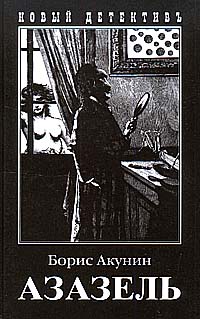I really should be writing the post I’ve been planning on deteriorating relations between the United States and Russia. It’s just a matter of digesting about eight or nine articles and a couple of major policy statements.
So instead I’ll write about Fandorin.
I’ve passed the halfway point of the set of detective novels by Boris Akunin, chronicling the adventures of the stuttering ratiocinator Erast Petrovich Fandorin in the waning years of the Russian monarchy, 1876–1905. This is another case of my discovering something that was already a smash hit. I stumbled across a couple of the Fandorin novels while  browsing in an online Russian bookstore, and the quaintly antiquarian covers caught my eye. Then the description piqued my interest: the books are part of a “literary project” to present “all genres of the classical criminal novel.” For instance, the first book, Azazel, was a “conspiratorial detective story” (конспиративный детектив); the book I’m starting now, Coronation, is a “detective story of high society” (великосветский детектив). I guess I have a soft spot for that sort of encyclopedic ambition. After reading the first two, I decided I had to have the whole set.
browsing in an online Russian bookstore, and the quaintly antiquarian covers caught my eye. Then the description piqued my interest: the books are part of a “literary project” to present “all genres of the classical criminal novel.” For instance, the first book, Azazel, was a “conspiratorial detective story” (конспиративный детектив); the book I’m starting now, Coronation, is a “detective story of high society” (великосветский детектив). I guess I have a soft spot for that sort of encyclopedic ambition. After reading the first two, I decided I had to have the whole set.
Between two Russian bookstores in the US, I managed to find them all—except one. Drat! Then I discovered that Akunin has a website where all the novels can be read online for free. (Gee, was that my first hint that this Fandorin stuff was no secret?) So what did I do? I created a PDF of the missing novel out of the web pages! Must … have … complete … set … Must … have …
And that’s how I read Leviathan (which is the name of a ship): a PDF printout. But then—lo and behold—I somehow found a third bookstore that had Leviathan (the third novel in the series) in book form. Naturally I had to have it. As it turns out, the printed version had a surprise in store. Each chapter is presented in the voice of the various characters (all suspects in a multiple homicide). One of them is Japanese, and his chapters are printed sideways! The series abounds in typographic shenanigans, sometimes effective, sometimes maddening (some of the script fonts are almost unreadable).
Speaking of things Japanese (and this is going to be stream-of-consciousness, there’s no way around it), the next novel introduced a sidekick for Fandorin, a sturdy and steady Japanese fellow named Masa (short for Masahuro). Fandorin apparently found much to admire in Eastern culture during a short visit to Japan between books three and four; this and subsequent installments contain much interesting stuff about Japanese philosophy, weaponry, physical training, and so on. Fandorin and Masa work out together every day—occasionally the scene conjurs up the image of Inspector Clouseau being ambushed by Cato (or vice versa), but the Fandorin books never descend to slapstick.
And wouldn’t you know it? The author is a Japanologist! But his name isn’t B. Akunin—it’s Grigory Chkhartishvili, and he’s editor-in-chief of a 20-volume anthology of Japanese literature. For a time he worked as assistant to the editor-in-chief of the magazine Foreign Literature.
Did I say he’s kind of famous? In 2000 he was named Russian Writer of the Year. Three of his Fandorin books have been made into big-budget films (one of them starring Nikita Mikhalkov), and several have been translated into English and other languages. All this from Wikipedia, which also has a nice chunky article about the fictional Fandorin!
Having got this far in the series, I have to say the coverage of the genres doesn’t seem exhaustive, or even particularly comprehensive, and the stylistic differences between the books aren’t as great as one would suspect. But despite any marketing excesses, they’re great fun, and the combination of historical detailing and a modern sensibility is quite satisfying to this particular reader.

